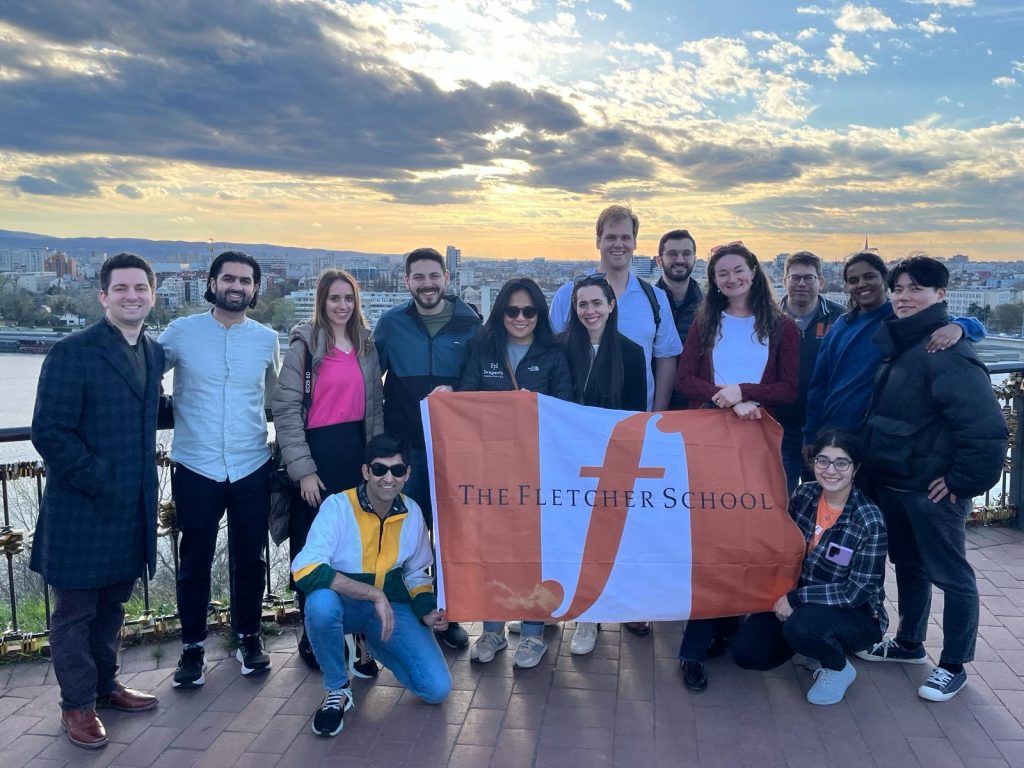Reflections from the March 2024 Western Balkans Study Trip
By Natasha Wood, MALD 2024 Candidate, The Fletcher School
In March 2024, the Fletcher Russia and Eurasia Program facilitated a study trip to Serbia, Kosovo, and North Macedonia to explore how Russian influence in the Western Balkans has changed since Russia’s invasion of Ukraine. The Fletcher delegation included twelve students and a team of three professors and staff. The study group is developing a substantive policy paper detailing their findings.
During the study trip, the Fletcher participants and invited guests met with local foreign policy experts, regional and U.S. government officials, students, and policymakers. In addition to examining Russian influence in the Western Balkans, other themes from the study tour included great power competition in the region, including the changing roles of the United States, China, the European Union, and NATO; regional security, including Russia’s military-technical assistance to Serbia and the Kosovo conflict; and regional energy dependence and business links to Russia.
One of the biggest takeaways from the study trip was that while Russian influence remains significant in the Balkans, especially in Serbia and the regional orthodox church, the picture on the ground is less clear.
Fletcher student Akshat Dhankher noted, “Great power influence is not the dominant driving force behind regional developments. As much as the Balkans are a crossroads of strategic interests for external actors like the United States, the European Union, Russia, and China, the problems in the region—political divides, ideological polarization, interstate disputes, rule of law issues—are Balkan problems, and they require locally-driven resolutions. Involvement by so-called great powers has been to find positions on the periphery of these issues, rather than driving them.”
Instead, participants learned from conversations with regional experts that the government of Serbian President Aleksandar Vučić plays a delicate balancing game between the West and Russia.
Fletcher student Constantinos Angelakis said, “I realized the limited presence of Russian media in Serbia, as well as the tensions between Russians and Serbs living in Belgrade. Having said that, the complex factors leading to skepticism of the West and sympathy for Putin in Serbia were very discernible through our conversations. I came away from our time in Kosovo with a far richer understanding of great powers’ instrumentalization of regional conflict. Finally, the historical context of the collapse of Yugoslavia and subsequent conflicts was a recurring theme throughout the trip that clearly shapes the realities on the ground today.”
Another recurring theme of the study tour was regional relations with the EU and NATO, including Serbia’s ongoing bid to join the EU and the legacy of the 1999 NATO bombing campaign.
Fletcher student Thomas Fitzgerald said, “There is work to be done to encourage further stability in the Balkans, particularly increasing NATO troop presence along the Kosovo border, lobbying the EU to speed up its accession process… and combating anti-Western sentiment through economic partnership. Russia’s influence in Serbia is growing and will continue to grow, [and] the EU has been grossly negligent in managing Serbia and the Balkans as a whole, which has posed a tremendous opportunity for adversarial nation-state actors to destabilize the region.”
Other expert meetings, roundtables, and panel discussions the delegation attended in Belgrade, Skopje, and Pristina touched on regional democratic backsliding.
Fletcher student Nayan Seth added, “The biggest highlight for me was our roundtable on ‘Serbia’s Political Landscape and Civil Society,’ convened by the Foundation BFPE for a Responsible Society. I got the opportunity to interact with many leading journalists and activists from Serbia. The attacks on the free press in Serbia were not similar to what was happening back home in India. They were looking at the U.S. and the West in general for support and to push back on democratic backsliding in the country. Speakers talked about government supporters’ online targeting of activists and a concerted attempt to silence their dissenting voices. It was an insightful discussion about the state of journalism in Serbia.”
The delegation also participated in cultural activities across Serbia, North Macedonia, and Kosovo.
Fletcher student Tatum Koroli noted, “I thoroughly enjoyed our cultural endeavors, such as visiting Novi Sad, a beautiful, multicultural city in the province of Vojvodina.” Koroli served as the trip’s student leader and completed a Fulbright grant in North Macedonia before Fletcher.
“I enjoyed our tour of Skopje strolling in the Old Bazaar, inhabited mostly by the ethnic Albanian minority, and visiting the Holocaust Memorial Center and learning about Jews in North Macedonia. Each iftar was also very special, from Pristina to Tetovo. I feel really proud that I could showcase Tetovo and Prishtina [on the study trip]. My colleagues… heard the Serbian perspective on many issues, and it was important to me they were also exposed to Albanian perspectives on nationalism, extremism, and efforts for peace and interethnic integration, ” she said.





